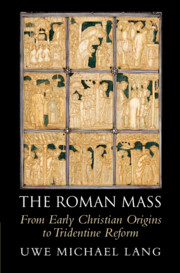Book contents
- The Roman Mass
- The Roman Mass
- Copyright page
- Contents
- Figures
- Acknowledgements
- Abbreviations
- Introduction
- 1 The Last Supper
- 2 The Eucharist in the Early Church
- 3 Development of Eucharistic Prayers in the Third and Fourth Century
- 4 The Formative Period of Latin Liturgy
- 5 Roman Stational Liturgy
- 6 The Expansion and Adaptation of the Roman Liturgy in the Carolingian Age
- 7 From the Ottonian Revival to the High Middle Ages
- 8 Decline and Vitality in the Later Middle Ages
- 9 The Tridentine Reform
- Epilogue
- Bibliography
- Index
7 - From the Ottonian Revival to the High Middle Ages
Published online by Cambridge University Press: 08 September 2022
- The Roman Mass
- The Roman Mass
- Copyright page
- Contents
- Figures
- Acknowledgements
- Abbreviations
- Introduction
- 1 The Last Supper
- 2 The Eucharist in the Early Church
- 3 Development of Eucharistic Prayers in the Third and Fourth Century
- 4 The Formative Period of Latin Liturgy
- 5 Roman Stational Liturgy
- 6 The Expansion and Adaptation of the Roman Liturgy in the Carolingian Age
- 7 From the Ottonian Revival to the High Middle Ages
- 8 Decline and Vitality in the Later Middle Ages
- 9 The Tridentine Reform
- Epilogue
- Bibliography
- Index
Summary
The period from the tenth to the twelfth centuries has often been overshadowed by the momentous liturgical developments that both preceded and followed it, but recent scholarship has highlighted its distinct contributions to the complex history I endeavour to trace in this book. This chapter will examine the genesis of the Ordo Missae as a distinctive set of prayers and rubrics for the priest, which would come to exert significant impact upon the ritual shape of the Roman Mass, especially with the spread of what is known as ‘private Mass’. From a broader perspective, due consideration will be given to the emerging tradition of the Romano-Germanic Pontifical and to the claims of the papal reform movement regarding the prevalence of the Roman liturgy in the Western Church. The thirteenth century proved pivotal in several ways, above all when a major step towards liturgical standardisation was taken by the decision of the rapidly expanding Franciscan Order to adopt the liturgical use of the Roman curia. Moreover, the profound veneration of the Eucharist at the time brought new elements to the rite of the Mass, such as the elevation of the consecrated species, and led to the institution of the feast of Corpus Christi. This chapter will conclude with a discussion of preaching at Mass in the central and later Middle Ages.
- Type
- Chapter
- Information
- The Roman MassFrom Early Christian Origins to Tridentine Reform, pp. 256 - 306Publisher: Cambridge University PressPrint publication year: 2022



